|
|
|
Sort Order |
|
|
|
Items / Page
|
|
|
|
|
|
|
| Srl | Item |
| 1 |
ID:
180232
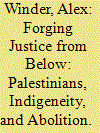

|
|
|
|
|
| Summary/Abstract |
This essay examines the practices and institutions of “rebel justice” that emerged during two of the most effective and sustained anti-colonial uprisings of the twentieth century, the Great Revolt and the First Intifada. It addresses these uprisings “from below” to illuminate their social foundations and the kinds of futures they imagined. For Palestinians, communal justice (sulh, ‘urf, and the like) have been prevalent forms of dispute resolution and justice-seeking. Rather than being written in a criminal code, the foundation of justice was based on shared notions of honor, redemption, and a social order that balanced hierarchical impulses with egalitarian ones. The essay also addresses Palestine’s place within abolitionist discussions currently under way in the United States, building upon the notable connections and parallels between the two geographies, from joint trainings undertaken by U.S. and Israeli forces to recent manifestations and longer traditions of Black-Palestinian solidarity.
|
|
|
|
|
|
|
|
|
|
|
|
|
|
|
|
| 2 |
ID:
180235
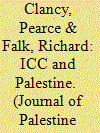

|
|
|
|
|
| Summary/Abstract |
The recent ruling of the International Criminal Court (ICC) affirming territorial jurisdiction over the West Bank, including East Jerusalem, and the Gaza Strip may at first appear to be a mere procedural decision outlining the court’s authority to investigate Israeli criminality. Upon closer scrutiny, however, it is clearly much more: an indirect, yet far-reaching vindication of Palestinian resistance and struggle in the ongoing “legitimacy war” with Israel. These legal proceedings have momentous potential implications for broader accountability efforts, which could be significant over time, even if attempts to prosecute Israeli perpetrators are ultimately frustrated. This legal event already sheds light on both the limitations of the court and the legal and geopolitical challenges it faces in cases where suspected perpetrators wield significant influence in international political arenas. As of now, the ICC has gained credibility precisely because it has the institutional courage to take on the architects of Israeli criminality.
|
|
|
|
|
|
|
|
|
|
|
|
|
|
|
|
| 3 |
ID:
180230
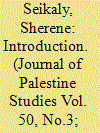

|
|
|
|
|
| Summary/Abstract |
Journal of Palestine Studies coeditor Sherene Seikaly introduces a cluster of essays by Sreemati Mitter, Alex Winder, Charles W. Anderson, and Haneen Naamneh that examines Palestinian “history from below.” The focus of these essays is on the everyday losses endured and the community-based forms of resistance enacted by ordinary Palestinians. Seikaly explains how, through the struggle against financial dispossession, the journey into insurgent law, broad-based collective civil disobedience, and Arab futurity in Jerusalem, these four essays make space for new understandings in the way we narrate Palestine, its history, and its people.
|
|
|
|
|
|
|
|
|
|
|
|
|
|
|
|
| 4 |
ID:
180228
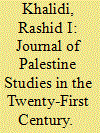

|
|
|
|
|
| Summary/Abstract |
The Journal of Palestine Studies is celebrating fifty years of uninterrupted publication as the journal of record on Palestinian affairs since its founding in 1971. Historian, book author, and Columbia University’s Edward Said Chair of Middle East Studies, Rashid Khalidi, has been at the helm as editor for almost two decades. In this article, he reflects on the Journal’s role in knowledge production on Palestine from a number of vantage points: the situation that obtained at the Journal’s founding when Palestinians simply did not have “permission to narrate” their own story in the Western public sphere; the evolution of the academic universe in the United States and its eventual embrace of disciplines, such as race, gender, Indigenous, and Palestine studies, once considered marginal or fringe; and the concomitant and virulent Zionist campaign to tar speech critical of Israel and the Zionist project with the brush of anti-Semitism, whether in the media, politics, or academia.
|
|
|
|
|
|
|
|
|
|
|
|
|
|
|
|
| 5 |
ID:
180234
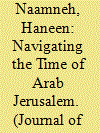

|
|
|
|
|
| Summary/Abstract |
For many Palestinians, the colonial denial of Palestinian self-determination in an independent nation-state has rendered futile the very notion of a future. But it is imperative to challenge the colonial logics that produce the native’s future as always already failed, unachievable, or impossible. This essay examines snippets of the life of Arab Jerusalem between the two major ruptures of 1948 and 1967 to deconstruct colonial and nationalist epistemologies of time and to challenge the persistently violent present and its domination of Palestinian pasts and futures. Using as its lens the memories and attachments of Jerusalemites who lived, worked, and struggled in the city, the essay examines the ways in which they thought of, imagined, produced, fulfilled, or were deprived of a future—in other words, how Jerusalemites shaped futurity. Such a nonlinear unfolding of time challenges dominant perceptions of the Nakba as constituting a clean break between past and present.
|
|
|
|
|
|
|
|
|
|
|
|
|
|
|
|
| 6 |
ID:
180233
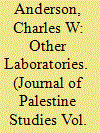

|
|
|
|
|
| Summary/Abstract |
This essay briefly examines a pattern of little-known local and general strikes staged by the Palestinian public during 1938, amid the Palestinian uprising known as the Great Revolt. While largely overshadowed by the armed struggle then underway, these nonviolent strikes illustrate the widespread character of Indigenous resistance to British colonial rule and of support for the rebellion. Palestine has often been described as a laboratory for repression; yet when we attend to Palestinian social history, we also see that it has been a laboratory of freedom struggle, popular resilience, and recurrent waves of activism and tactical experimentation.
|
|
|
|
|
|
|
|
|
|
|
|
|
|
|
|
| 7 |
ID:
180229
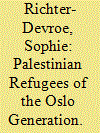

|
|
|
|
|
| Summary/Abstract |
This article analyzes the political narratives and critiques of young Palestinian refugees who have grown up in the bleak post-Oslo period. Based on ethnographic fieldwork and interviews conducted with refugee youth in Jordan and the West Bank between 2009 and 2014, I show that this generation of refugees endorses a collective Palestinian identity and peoplehood with claims to the (home)land while also narrating their identities and relations to land, nation, state, and rights as complex, multifaceted, and fractured. Their political imaginaries do not limit the political and epistemic project of decolonizing Palestine to the classic paradigm of a territorialized nation-state as enshrined in the Oslo two-state agenda. Rather, they point to a creative and radical, post-nation-statist, translocal politics for Palestine.
|
|
|
|
|
|
|
|
|
|
|
|
|
|
|
|
| 8 |
ID:
180231
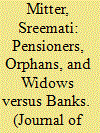

|
|
|
|
|
| Summary/Abstract |
This essay attempts to rectify the silence about the willful expropriation, by British and Israeli forces, of private Palestinian financial assets. Placing at its core the stories of ordinary Palestinians, it explores how they were robbed of their bank accounts, bonds, stocks, pensions, salaries, and safety deposit boxes during the creation and termination of the Palestine Mandate (in both 1917 and 1948). The essay argues that the basic financial structure of colonization, which deprives the colonized of the protection of sovereign banking institutions, facilitated these thefts. It also argues that the supposedly neutral rules of finance acted as a fig leaf to such dispossessions. Based on archival research and oral histories, it presents a new social history of finance that centers the experiences and subjectivities of non-elite Palestinians who strove to defend themselves and assert their rights, individually and collectively, during pivotal moments of violent upheaval and rupture.
|
|
|
|
|
|
|
|
|
|
|
|
|
|
|
|
|
|
|
|
|